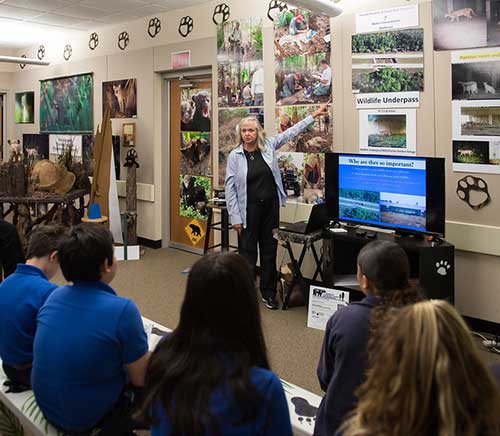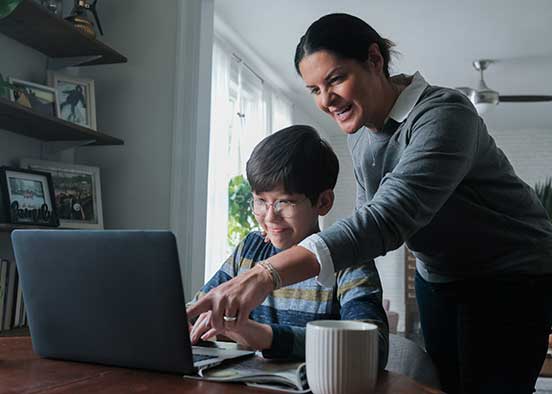If Southwest Florida’s homebound families with children of all ages are looking for new activities to keep confined, restless kids educated and entertained both indoors and out — and we bet more than a few loving-but-frazzled parents just might have reached the point of welcoming such help, not to mention teachers who seek all the distance-instruction assistance they can get — there are Wings of Hope flying your way.

The wings are from the Eagles of Florida Gulf Coast University, and the help they represent comes from more than just the actual Wings of Hope nature-education program for elementary students created and still directed by “Mrs. Ricky” Pires through the Department of Integrated Studies. Many FGCU faculty, staff and students have quickly rallied to help the greater community through a variety of efforts: a collaborative matchmaking initiative that connects K-12 school teachers and scientists, and another program that curates virtual field trips — both coordinated here by Dr. Jennifer Jones, associate professor and director of the Center for Environmental and Sustainability Education; a special nature activity guide produced by Pires and education director Ann Godsea of Wings of Hope that families can use together; and programming provided by WGCU Public Media that goes above and beyond its usual educational missive.
A Scientist in Every Florida School
In a home-educational effort with a STEM emphasis, Jones and FGCU are working to support K-12 school districts with remote science instruction after educators identified a need for increased access to the Scientist in Every Florida School program. The mission of SEFS is to build long-term relationships between teachers and scientists, better integrate current scientific research and big data into classroom lessons that adhere to Florida Sunshine State Standards, and connect a scientist with every school in the state.
The Center for Environmental and Sustainability Education (CESE) is partnering with the SEFS program to bring it to all school districts across the state, beyond the original five pilot counties. “Our goal is to enroll more scientists as virtual guest speakers and to help promote the program widely to educators throughout Florida,” Jones said.
“The partnership helps us expand the impact of science learning on K-12 students and provides a pathway for FGCU scientists and researchers to share their passion and work with teachers and students around the state,” Jones added. “Many of our FGCU scientists already have great relationships with local classrooms, so the partnership with SEFS allows them to reach even more classrooms around the state by serving as virtual visiting scientists.”
With the original program already in place since 2019, “we were able to scale up our work together very quickly in response to COVID-19,” Jones said. “Just in the past few weeks, we have seen lots of new teachers from around Southwest Florida request virtual visits from scientists. Our FGCU community has definitely answered the call by signing up to share their passion and expertise as visiting virtual scientists.”
Scientists can volunteer to participate by going to this link. Teachers requesting access to a guest scientist should visit this link.
“Once participants are signed up, the program will contact you when an opportunity arises for a scientist to work directly with a teacher,” Jones said. “The virtual visits are designed to support the standards-based curricular needs of teachers, so scientists should expect to respond to the self-identified needs of K-12 teachers.”
Stephanie Killingsworth, outreach coordinator for SEFS, said, “It made sense for FGCU, which has strong relationships with the community, to use those connections to leverage the virtual platform used by SEFS to connect teachers and scientists. It’s a testament to the resilience of Floridians and how we are able to pull together and move mountains.”
Virtual field trips
“The other thing I heard from local school districts was the need for virtual field trips aligned to standards,” said Jones, introducing the second program for K-12 students that she says she would “love shouted from the rooftops.”
“Teachers are drowning in tons of general content, so what they really need is help to filter out lesson-based material that meets their rigorous standards,” Jones said. “CESE and our team of three student workers jumped on the opportunity, and built a Google Sheet database that curates the best virtual field trips from around the state, the country and the world.”
Every field trip includes a formal lesson plan tied to Florida CPalms and Next Generation Science standards. The database is updated daily by the student workers — environmental studies majors Julie Motkowicz and Hannah Turbiville and biology major Jonathan Salas — and teachers can search by keyword, standard and grade level.
“Being a student who’s passionate about constantly learning new things and sharing with others, it feels great to know there will be no halt in learning or teaching,” Motkowicz said.
Turbiville added that, “Knowing that this project will benefit teachers and students across Lee County and beyond has brought me great joy and satisfaction. I am so happy that I can still make a difference in my community while also staying at home.”
Wings of Hope
Pires, who founded the Wings of Hope program 20 years ago, said, “Ann and I wanted to help out the Panther Posse (an estimated 5,000 fourth-and fifth-grade students from Lee and Collier counties they educate about nature during the school year) and other students, teachers and their families throughout our counties and the state of Florida during these challenging times.
“We created fun and educational activities called ‘I Spy Nature in My Home Habitat,’ and all they have to do is go to the website and download the activities,” Pires said. “They can copy or write them on a pad, if no printer is available.”
The booklet has 11 pages of fun, educational nature activities kids and parents can do together, ranging from “I Spy” searches to Backyard Bingo. “We suggest they work with a family member around the home, and then maybe have their other (local or out-of-town) families and friends do the same activities, and compare their findings by way of email, phone or FaceTime,” Pires said.
Pires and Godsea, who taught elementary school for 19 years, are contacting teachers who are part of the program and encouraging them to pass the booklet along to their peers. “All the activities are aligned to Florida’s state standards and offer enrichment opportunities through STEM,” Pires said. “Most of the activities can be done by children as young as second- or third-graders with help from their families, even older siblings.”
Noting that this latest effort falls in line perfectly with Wings of Hope’s mission of “building bridges of hope with education, research and awareness,” Pires added that in coming weeks, she and Godsea will be uploading more activities, focusing on the endangered Florida panther and black bear.
At-Home Learning from PBS
Meanwhile, Dayna Harpster, communications specialist for WGCU Public Media at FGCU, reports that Florida PBS stations — including WGCU — have changed their weekday television schedules to air programming supporting students now learning at home.

From 6:30 a.m. to 6 p.m. Monday through Friday on WGCU’s main channel (30.1 over the air; 440 on cable), At-Home Learning includes specific blocks of time to serve levels from pre-K through 12th grade, covering subjects including English/language arts, social studies, science and math. These programs are aligned to state standards and are free and accessible from home. WGCU began broadcasting these programs Monday, March 23.
The schedule of programs on WGCU HD changes weekly. It includes educational episodes from “NOVA,” “Nature,” “History Detectives” and “American Masters” about such topics as dinosaurs, wars, sharks, space, great books and many others. Since not all students have internet access throughout the day, Florida PBS decided to offer this specific educational programming on television – although it is supplemented with additional resources at WGCU Kids. The new educational TV lineup also is on that page.
“Creating blocks of quality programming for teachers to assign to their classes to view at home keeps everyone engaged. This is a game-changer that can level the technology playing field. PBS has always been about expanding knowledge,” said Randy Wright, chair of Florida Public Media.
Teachers can follow up with discussion questions, worksheets or hands-on projects and experiments when they communicate with their students.
“This is an opened-ended commitment to support kids, families and educators during this unprecedented crisis. We will continue to monitor the situation and adjust our program offerings to maximize WGCU’s benefit to the many communities we serve as events warrant.” said WGCU General Manager Rick Johnson.
For more information, contact Pamela James at [email protected].